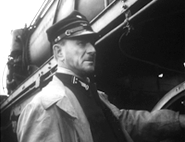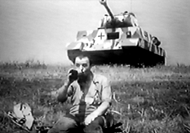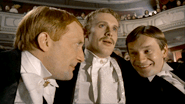At dusk, the impressive sight of a steam engine passenger train bisects the horizon, traversing an empty stretch of track under construction near a rural train station. The train engineer Zapora (Zygmunt Listkiewicz) and his junior assistant Nowak (Roman Klosowski) perform a station check of the semaphores and, upon seeing only one light on, proceeds […]
Tag: Polish Cinema
Eroica, 1957
Prefaced as a heroic symphony in two parts, Eroica is a darkly comic, intelligent, and unorthodox chronicle of the Polish resistance against the Germans in World War II, a movement commonly referred to as the Warsaw Uprising. The first movement, Scherzo alla polacca, opens to a shot of an apprehensive and reluctant militia soldier named […]
Sweet Rush, 2009
Part coming of age story set in the aftermath of the Warsaw Uprising, and part personal testament by lead actress Krystyna Janda on her husband, Edward Klosinski’s battle with cancer during filming, Andrzej Wajda’s poignant, if disarticulated Sweet Rush, on the surface, suggests kinship with the metacinema of Abbas Kiarostami in exploring the interpenetration between […]
Without Anesthesia, 1979
A successful international journalist, Jerzy Michalowski (Zbigniew Zapasiewicz), makes a guest appearance on a televised variety show to reflect on his life and work. Candid and self-assured, Jerzy’s evasive comments on the limited freedom of the Polish press on domestic issues causes concern to a programming official who believes that the serious topics discussed in […]
Man of Marble, 1977
Agnieszka (Krystyna Janda) is a determined and tenacious film student who believes that she has found the ideal subject for her diploma film: an investigative documentary on Mateusz Birkut (Jerzy Radziwilowicz), a postwar working-class hero who fell into government disfavor and disappeared into obscurity. Her producer (Boguslaw Sobczuk) reluctantly agrees to give her 21 days […]
The Promised Land, 1975
An introductory shot of a solemn, aging German aristocrat named Bucholz (Andrzej Szalawski) gazing abstractedly out the window of his opulently furnished, baroque estate in morning prayer that is intercut with cutaway images of workers emerging from crude shantytowns built alongside the railroad tracks establishes the polarized economic climate of late nineteenth century Lodz, as […]



